QuestionHi,
I bought two Reeves turtles from you-they are both about three now. We did a ton of research on how to keep them, and their health has been very good until this week. The larger of the two, who we now know is a female, became very weak and listless the last few days, until finally she appeared to have drowned. She was upside down in the bottom of the tank, completely submerged, and did not display any signs of life when my wife removed her, so she did some hasty research and found a description of how to revive a drowned turtle. After some very careful "cpr" she spit up some water and showed some signs of life. I took her to a vet that same day, and he said that she was dehydrated and weak. He did an x-ray to check her lungs for signs of pneumonia, but everything looked ok. What the x-ray clearly showed, however, was an egg. The doc seemed to think that her extreme apathy (she is normally very active, gregarious, and hungry) was related to her being "egg-bound". He gave her a shot of something to induce laying, but it did not work. That was yesterday. We now have her in a private, warm sandbox filled with clean damp sand and a small dish of water that is deep enough to keep her moist, but not deep enough that she could drown. We have the environment at about 80-85 degrees, and we have been giving her a daily (force-fed) meal of this reptile intensive care food that the vet gave us (a vegeterian semi-liquid). She is extremely lethargic and weak, shows no interest either in digging or in eating, and prefers to remain in her little pool. She is also on a daily antibiotic since last night.
Nobody around here (near Seattle) seems to know very much about Reeves turtles, including the vets, and information on the internet is sometimes misleading. The vet told us that if she doesn't lay the egg, she will die, and that we might have to take her 90 miles away to a specialist to have have the egg surgically removed. One website we looked at said that the egg may simply dissolve and be absorbed in time. In short, we are new to all this, confused as to what we should do, and very worried for our turtle.
We are hoping that you can tell us what is normal for a gravid reeves, how long this may last, how to avoid it in the future (since we do not want to breed them) , and what we can do to help her with this situation both in the short and long term. We would greatly appreciate any and all information you can give us about this. I know it's Friday and you're probably just as busy as we are, but if you can take a second to e-mail us back hopefully today, it would make all the difference to a couple of frazzled turtle lovers way up here in Washington.
update
she passed her egg but won't eat and is barely moving
Thank you so much,
AnswerHi,
You didn't buy your turtles from me; I don't keep Reeves (or any aquatics right now, for that matter--I specialize in tortoises).
It's good she passed her egg, but unfortunately unless the egg was obviously calcified (had a heavier shell than normal, indicating it had been retained for a long time), it's hard to say if egg binding was really the problem or not. If she had been healthy up until recently and you didn't notice any symptoms prior to her becoming so weak--restlessness, agitation, lack of appetite, digging motions with the hind legs--the egg issue may just be coincidence.
You know she doesn't have pneumonia, so that's good. Are you seeing any other symptoms at all, aside from the extreme lethargy? Any changes in coloration in her skin or shell? Was there any change at all in her behavior prior to becoming ill? I suspect some kind of systemic infection, but it's hard to say just what. You could have some blood tests run, but at this point I think it's important not to stress her unnecessarily, and she's already on an antibiotic.
I have to tell you that this level of lethargy is bad. Turtles are very good at hiding sickness, and when it gets to the point where they're not really moving or opening their eyes, it's getting pretty close to the point of no return. I think you're doing everything you can right now. I would remove her from the sand, though, because of the impaction risk if by some chance she improves enough to ingest any. You can keep her on damp spagnum moss (not peat moss, but the long strand kind), damp towels, anything like that. Just keep her out of deeper water until you're sure she's better.
Female turtles can develop eggs whether they've mated or not, but obviously if she survives it would be a good idea to separate her from the male (unless it turns out to be a female). Males tend to stress females anyway, unless there are multiple females or the enclosure is very large. Sometimes lone females lay regularly, sometimes not. The only way to absolutely prevent egg laying is to remove the female reproductive organs, but that's generally pretty extreme. Just see if she recovers and go from there.
This might be a long shot, but you could try contacting someone at World Chelonian Trust: http://www.chelonia.org/contact.htm. I don't think Paula Morris keeps Reeve's, but she's very knowledgeable generally and very nice. Darrell Senneke wrote their care sheet on Reeve's.
You could also try contacting the Pacific Northwest Herp Society to see if any of their members keep Reeve's: http://www.pnwhs.org
I'm sorry I couldn't be more help. Please let me know how she does.

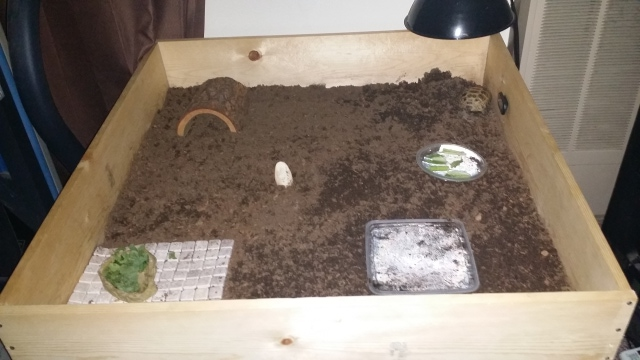 My new Russian Tortoise not eating
QuestionQUESTION: I purchased a Russian Tortoise from P
My new Russian Tortoise not eating
QuestionQUESTION: I purchased a Russian Tortoise from P
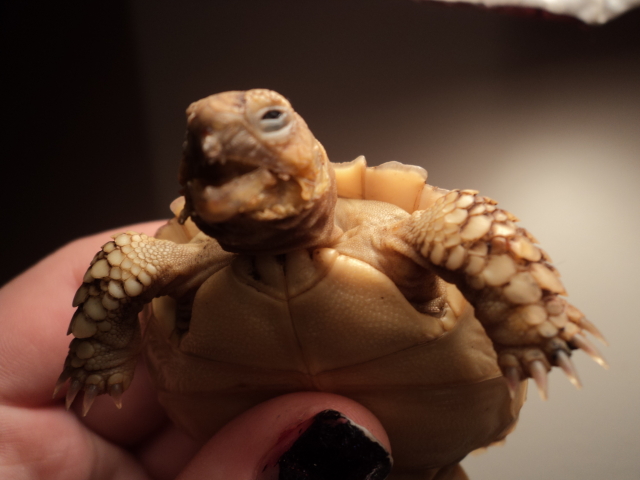 My baby Sulcata :( !!
QuestionPicture of my Sulcata
QUESTION: Okay, so
My baby Sulcata :( !!
QuestionPicture of my Sulcata
QUESTION: Okay, so
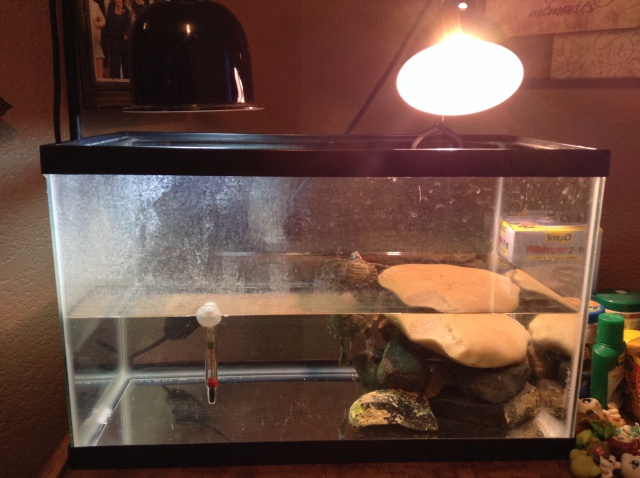 Red Eared slider in shock
QuestionQUESTION: I just cleaned my turtle cage today w
Red Eared slider in shock
QuestionQUESTION: I just cleaned my turtle cage today w
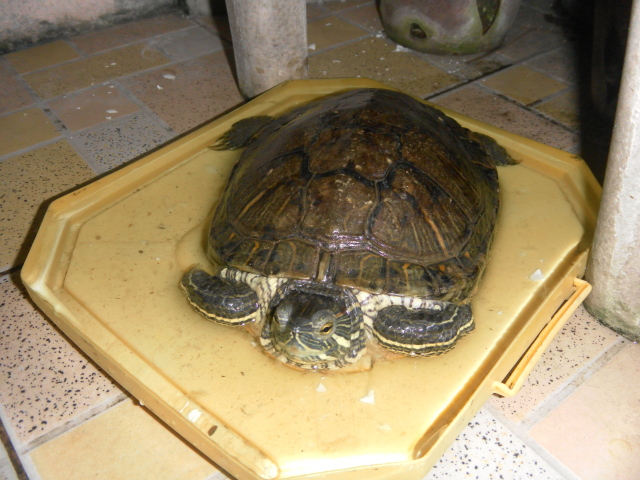 another pic
Question
obese
heres another pic of my pet
AnswerHey
another pic
Question
obese
heres another pic of my pet
AnswerHey
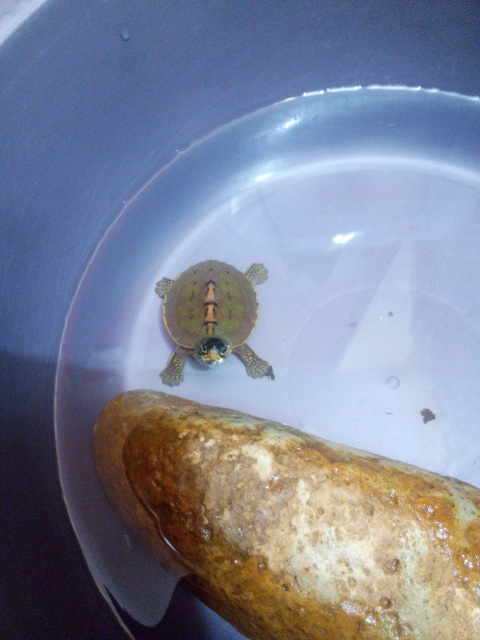 Indian roofed turtle (pangshura tecta)
QuestionQUESTION: Hi,
I have a Indian roofed turtle (Pa
Indian roofed turtle (pangshura tecta)
QuestionQUESTION: Hi,
I have a Indian roofed turtle (Pa